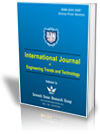Artificial Intelligence in the Legal Industry: A Boon or a Bane for the Legal Profession
Citation
MLA Style: Rishabh Srivastava "Artificial Intelligence in the Legal Industry: A Boon or a Bane for the Legal Profession" International Journal of Engineering Trends and Technology 64.3 (2018): 131-138.
APA Style:Rishabh Srivastava (2018). Artificial Intelligence in the Legal Industry: A Boon or a Bane for the Legal Profession. International Journal of Engineering Trends and Technology, 64(3), 131-138.
Abstract
The paper focuses on the impacts that Artificial intelligence can have on the legal profession. The computerization of the various jobs in different sectors due to the advancement of technology has made the work of human to be replaced by computers and robots. There are anxiety and fear hovering over the minds of the people that whether their jobs are going to be taken up and replaced by the computers in the future. The impact of technology is certainly having an impact on the various sectors making them prone to the use of such technology. Similarly, the legal profession is also affected by the advancement of technology and much truly has gone through an adoption of such technologies. There has been a constant debate among the people involved in the legal industry that whether Artificial Intelligence or technology advancement is going to take up the jobs of the lawyers working at the lower and middle-level handling research work and drafting process etc., or whether is it going to be proved as a boom to the legal industry by making the task easier. The paper is divided into broadly four sections. Firstly it explains briefly to the readers what Artificial Intelligence really is in a layman’s language; secondly it explains the presence of artificial intelligence in the legal industry talking about its history and impact from then onwards; third part talks about the various pros and cons which artificial intelligence have or might have on the legal industry; the fourth and the last part talks about how the advantages of artificial intelligence outweighs the cons it has. Though AI is a new concept to many, the paper tries to explain all such information’s and impacts it might have in a layman’s language.
Reference
[1] Michael cross, DECEMBER 15, 2015, ?Top 5 sectors using artificial intelligence?, ?https://www.raconteur.net/technology/top-5-sectors-using-artificial-intelligence?
[2] https://www.datarobot.com/wiki/artificial-intelligence/
[3] Oksana Tunikova. ?What You Need To Know About Artificial Intelligence?. StopAd Blog, January 5, 2018,https://stopad.io/blog/artificial-intelligence-facts
[4] Margaret Rouse.? AI (artificial intelligence)?. August 2018,https://searchenterpriseai.techtarget.com/definition/AI-Artificial-Intelligence
[5] https://www.sas.com/en_in/insights/analytics/what-is-artificial-intelligence.html
[6] Hemendra Singh. ?What is AI? Know all about Artificial Intelligence?. June 23, 2018,http://customerthink.com/what-is-ai-know-all-about-artificial-intelligence/
[7] Buchanan, Bruce G., and Headrick, Thomas E. Some speculation about artificial intelligence and legal reasoning. Stanford Law Review (1970): 40-62.
[8] McCarty, L. Thorne. Reflections on" Taxman: An Experiment in Artificial Intelligence and Legal Reasoning. Harvard Law Review (1977): 837-893.
[9] Stamper, Ronald K. The LEGOL 1 prototype system and language. The Computer Journal 20.2 (1977): 102-108.
[10] Hafner, Carole D., (1981). Representing knowledge in an information retrieval system. in Oddy, R et al. (editors) (1981). Information Retrieval Research. London: Butterworths.
[11] Gardner, Anne The design of a legal analysis program. AAAI-83. 1983.
[12] Rissland, Edwina L. Examples in Legal Reasoning: Legal Hypotheticals. IJCAI. 1983.
[13] Sergot, Marek J., et al. The British Nationality Act as a logic program. Communications of the ACM 29.5 (1986): 370–386.
[14] Niblett, Bryan, ed. Computer science and law. CUP Archive, 1980.
[15] Ciampi, Costantino, and Martino, Antonio. Artificial intelligence and legal information systems. Elsevier Science Inc., 1982.
[16] Walter, Charles. Computer power & legal language: the use of computational linguistics, artificial intelligence, & expert systems in the law. Greenwood Publishing Group Inc., 1988.
[17] List Archived December 17, 2014, at the Wayback Machine. of past ICAIL conferences
[18] For a contemporary discussion of a selection of papers from the first thirteen conferences, see Bench-Capon, Trevor, et al. A history of AI and Law in 50 papers: 25 years of the international conference on AI and Law. Artificial Intelligence and Law 20.3 (2012): 215-319.
[19] List of AI and Law journal volumes
[20] List of Jurix conferences
[21] See the list of workshops on the Jurisin 2014 page
[22] Valente, A. 1995. Legal Knowledge Engineering; A Modelling Approach, IOS Press, Amsterdam.
[23] Robert W. van Kralingen, Pepijn R. S. Visser, Trevor J. M. Bench-Capon, H. Jaap van den Herik: A principled approach to developing legal knowledge systems. International Journal of Human-Computer Studies. 51(6): 1127-1154 (1999)
[24] Rinke Hoekstra, Joost Breuker, Marcello Di Bello, Alexander Boer: The LKIF Core Ontology of Basic Legal Concepts. Proceedings of the 2nd Workshop on Legal Ontologies and Artificial Intelligence Techniques. 2007: 43-63
[25] "Computational Law, Symbolic Discourse and the AI Constitution—Stephen Wolfram". stephenwolfram.com. Retrieved 2016-10-12.
[26] CHRISTOPHER MOYER, MAR 28, 2016, https://www.theatlantic.com/technology/archive/2016/03/the-invisible-opponent/475611/
[27] ?AI Beats Human Lawyers at Contract Reading – By being 200 Times Faster!?. AISHWARYA SINGH, FEBRUARY 27, 2018, https://www.analyticsvidhya.com/blog/2018/02/ai-beats-human-lawyers-reading-contract/
[28] ?Law Firms in Transition 2017: An Altman Weil Flash Survey?, http://www.altmanweil.com/LFiT2017/
[29] See Contract Express® http://www.contractexpress.com/, LawGeex – Contract Review and Approval Automation Tool (this tool in particular has huge potential to save time and relieve in-house lawyers of low value contract review work).
[30] Automated document drafting programs are frequently incorporated into document management software used by law firms. See supra note XX.
[31] See Bird & Bird‘s ?Contract Risk Assessment Tool.?
[32] ?Artificial Intelligence (AI) in Law Departments: Opportunities,? LinkedIn® Pulse, posted October 5, 2016 (Peter Krakaur).
[33] https://legal.thomsonreuters.com/en/insights/articles/benefits-of-artificial-intelligence
[34] Avaneesh Marwaha, July 13, 2017,? Seven Benefits of Artificial Intelligence for Law Firms?, https://www.lawtechnologytoday.org/2017/07/seven-benefits-artificial-intelligence-law-firms/
[35] Andrew Kucheriavy, ? Artificial Intelligence Will Take Your Job: What You Can Do Today To Protect It Tomorrow?, https://www.forbes.com/sites/forbestechcouncil/2018/02/26/artificial-intelligence-will-take-your-job-what-you-can-do-today-to-protect-it-tomorrow/#7d4fc4bc4f27
[36] https://www.techrepublic.com/article/ai-is-destroying-more-jobs-than-it-creates-what-it-means-and-how-we-can-stop-it/
[37] ?HOW MUCH DOES ARTIFICIAL INTELLIGENCE (AI) COST IN 2018?‘‘, Oct 25, 2017, https://azati.com/how-much-does-it-cost-to-utilize-machine-learning-artificial-intelligence/
[38] https://www.oxfordmartin.ox.ac.uk/downloads/academic/The_Future_of_Employment.pdf
Keywords
Artificial intelligence, Legal profession, jobs, lawyer, technology.



